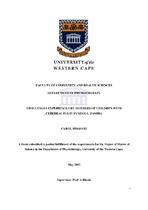Challenges experienced by mothers of children with cerebral palsy in Ndola, Zambia.
Abstract
About 10% of children world-wide experience developmental disorders and require access to the health care system. These disorders also require extensive care giving, often throughout childhood and into the adult years. Cerebral palsy (CP) is one such chronic condition, and can serve as a major cause of childhood disability. It is the commonest cause of neurological impairment in childhood and is associated with functional limitations and lifelong disability. Providing the high level of care required by a child with long-term functional limitations can become burdensome and may impact on both the physical and psychological health of the care giver. To prevent problems suffered by mothers of children with CP, it is important to explore the challenges experienced. All studies conducted previously on cerebral palsy in Zambia focus on impairments and difficulties experienced by children with CP and none of the mothers’ challenges have been explored. The aim of this study therefore was to explore the challenges that mothers of children with cerebral palsy experience in Ndola, Zambia. The study was conducted at two rehabilitation centers (Twapia and Mushili) under the Community Based Rehabilitation (CBR) catchment area in Ndola. A qualitative research design was employed. The mothers were stratified and purposefully selected and interviews were stopped once theoretical saturation was reached. Permission to conduct the research was obtained from relevant bodies and ethical issues were observed throughout the study. Sixteen (16) mothers of children with CP were interviewed. In-depth interviews were done using an interview guide which was designed after extensive review of literature. The interviews were audio recorded. The recorded data was transcribed verbatim and thematic analysis was used to analyze the data. The results showed that the mothers faced many challenges which included emotional, physical health, socio-economic, environmental, misdiagnosis of the condition of their children, marital problems and lack of implementation of policies regarding children with CP by the Zambian government

